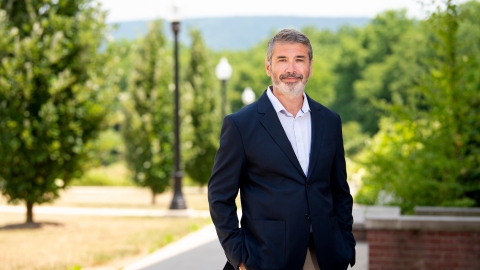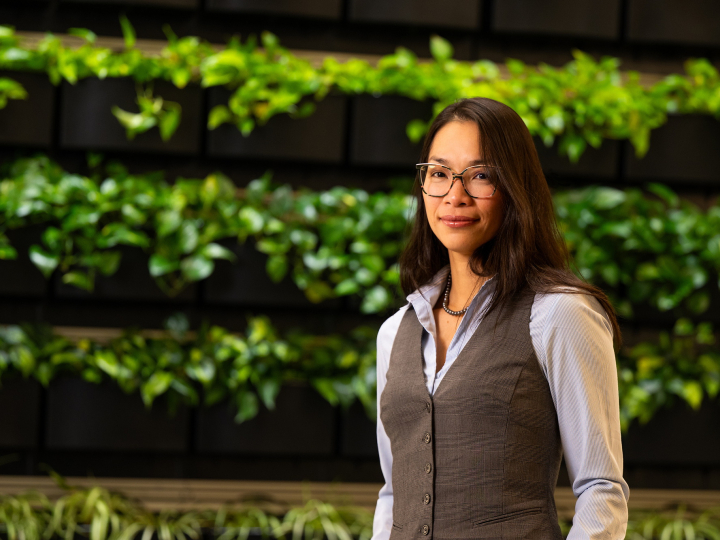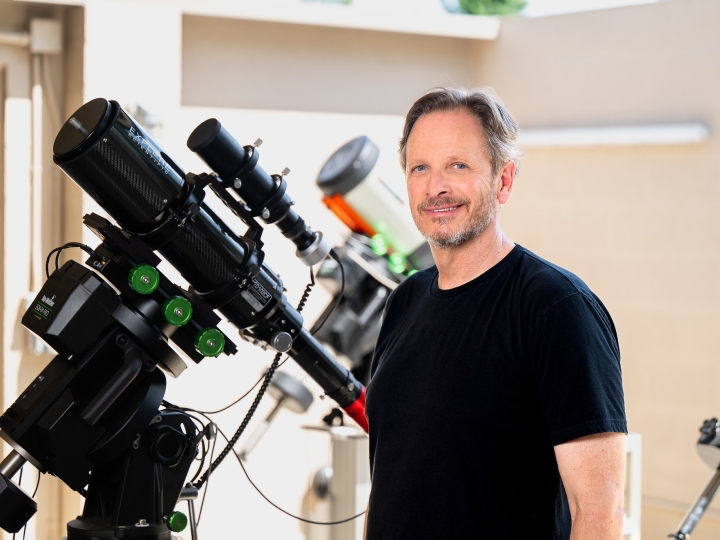
Matías Vernengo, Economics
November 4, 2022
Professor Matías Vernengo, economics, director of the Bucknell Institute for Public Policy and co-editor-in-chief of the New Palgrave Dictionary of Economics. Photo by Emily Paine, Marketing & Communications
"I want my students to learn that they can take all of these things — deficits, markets, fiscal policies — that may seem abstract and apply them in practical ways."
Professor Matías Vernengo's Academic West office is brimming with books — hundreds are arranged in cases that stretch floor to ceiling and line each wall. Among them, you'll find prized possessions: Alexander Hamilton's Official Reports on Publick Credit, a National Bank, Manufactures and a Mint, and a rare edition of On the Principles of Political Economy and Taxation, published in 1821 and 1817, respectively.
Yet, the book collector's most cherished relic is an unassuming booklet published in Portuguese by Chilean economist Osvaldo Sunkel. Vernengo received it from a high school teacher in 1985, and it's been with him (physically and intellectually) ever since. Vernengo credits Sunkel for opening his eyes to the symbiotic relationship between developed and underdeveloped countries: One prospers at the sacrifice of the other.
Connecting those dots broadened Vernengo's perspective of the world, enabling him to see economics as a thread that connects countries' histories, policies, governments and people. Reading it sparked his interest in studying economics and, ultimately, shaped his life's work. (In fact, Vernengo's book, Why Latin American Nations Fail, is dedicated to Sunkel.)
What Vernengo discovered as a teenager — that economic history provides valuable context to understanding modern-day global challenges — continues to fascinate him and influence his teaching and scholarly work.
"I want my students to learn that they can take all of these things — deficits, markets, fiscal policies — that may seem abstract and apply it in practical ways," he says. "Bucknell students are up to challenging coursework and conversations. They can be pushed. In our small classes, we have good conversations. We talk about things like inflation, not just from an academic perspective, but drawing on their own personal experiences. There is a lot of anxiety around inflation, and it's valuable to be able to talk about that and draw historic parallels to help make sense of it."
Vernengo draws on his own personal history in these conversations. When he was a child, his family fled Argentina for Brazil just before the 1976 Argentine coup d'etat. It was a tumultuous, unstable time. The Vernengos occasionally returned to Argentina to see extended family. During those visits, Vernengo witnessed the impact of hyperinflation.
During the 1980s and 90s, Argentina's inflation rate soared to over 1,000%. (For comparison, Americans are currently grappling with 8% inflation). "You'd be shopping in a supermarket and someone would change the prices on items just as you were taking them off the shelf," he says. "People have a difficult time wrapping their heads around that."
Helping students do just that — wrap their heads around economic trends — is at the heart of his work as an educator.
Outside the classroom, Vernengo's expertise in macroeconomic issues of developing countries and international political economics has made him a respected advisor.
In 2011, he was recruited by his native country to advise their financial policy. He took a two-year leave of absence from teaching to serve as senior manager of economic research at the Central Bank of Argentina. It was an opportunity to put his scholarly expertise into practical use. He provided insight into monetary policy and made recommendations to the nation's president and finance minister.
He has also acted as an external consultant for the International Labor Office, United Nations Development Program and the United Nations Conference on Trade and Development. Currently, Vernengo is a consultant for the Economic Commission for Latin America and the Caribbean; he provides officials insight into the region's recent inflation acceleration.
Vernengo's work to help others navigate economic challenges sets an example for his students, many of whom share the same desire to use their knowledge to benefit others.
"Bucknell students are very motivated, they want to make a difference and help other people," Vernengo says. "What they learn here in economics gives them a foundation that will benefit them if they go on to work on Wall Street. But it can also help them make positive contributions in other fields like health, environment, education and public policy."

